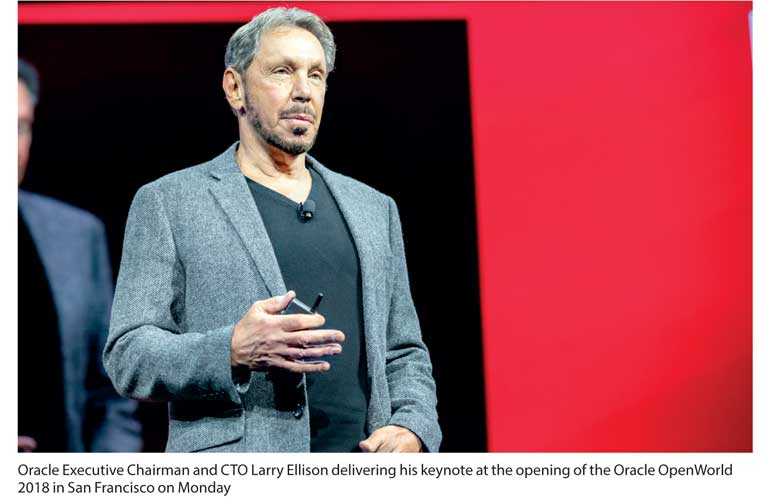Wednesday Feb 18, 2026
Wednesday Feb 18, 2026
Thursday, 25 October 2018 00:00 - - {{hitsCtrl.values.hits}}

Oracle Executive Chairman and CTO Larry Ellison on Monday shared his vision for a second-generation (Gen 2) cloud that is purpose built for the enterprise and more technologically advanced and secure than any cloud on the market.
Speaking at the opening keynote at Oracle OpenWorld 2018, Ellison said while first generation clouds are built on decade-old technology, Oracle’s Gen 2 Cloud is built specifically to help enterprises run the most demanding workloads securely.
With a unique architecture and capabilities, Oracle Cloud is able to deliver unmatched security, performance, and cost savings. Additionally, only Oracle Gen 2 Cloud is built to run Oracle Autonomous Database, the industry’s first and only self-driving database.
“Our goal has always been as we move from one generation of computing to the next, to protect your investment in data and applications and make it easy to lift and move that into the next generation. We did that with Gen 2 Cloud,” Oracle boss said in his keynote at OOW2018 which draws over 60,000 participants during the four-day event.
“The design goal of Oracle’s Gen 2 Cloud is one secure platform to run everything. It’s easy to say, very hard to do, to build a secure cloud. It required a fundamental re-architecture of our cloud.”
The foundation for Oracle’s Gen 2 Cloud, Oracle Cloud Infrastructure is designed to run any enterprise workload securely. Oracle’s modern IaaS offers native support for Oracle Autonomous Database and delivers new levels of security from core to edge to protect critical data.
In his keynote Ellison spoke at length about the current state of cyber defence, which he said, “is just not good enough”.
“We’ve used a lot of the latest artificial intelligence and machine learning to find threats. You’re not fighting with both hands tied behind your back anymore,” Ellison added.
To address that paramount issue, he announced new Oracle Cloud Infrastructure security services that are highly automated, detective and predictive to help remediate threats. Reinforcing Oracle Cloud’s unmatched security, Ellison illustrated how Oracle Autonomous Database uniquely scans for security threats and applies security updates while running to help prevent cyberattacks and data theft.
He also discussed Oracle Autonomous Database, the world’s most popular and technologically advanced database. Revolutionising data management, Oracle Autonomous Database manages, tunes and patches itself, enabling users to innovate faster on a highly secure platform that allows users to pay for only what they use.
“With Oracle Autonomous Database, there is nothing to learn and nothing to do, which makes it really easy to use. Developers are more productive, they bring up new applications, they do a better job of analysing data. Your system is more reliable. It never goes down,” Ellison added.
Extending Oracle’s autonomous database capabilities, Ellison previewed new deployment options, including dedicated Exadata Cloud Infrastructure and Cloud at Customer. Customers can choose to deploy their Autonomous Database on Dedicated Exadata Cloud Infrastructure for workload isolation to enable even greater security and reliability for mission-critical workloads. Oracle Autonomous Database Cloud at Customer is ideal for customers who choose not to move to a public cloud because of regulatory requirements but want the benefits of Oracle Autonomous Database in their own data centre.
He also shared benchmark test results during short demonstrations that highlighted the huge performance gap between Oracle and Amazon. The benchmarks compared Oracle Autonomous Database against key offerings from Amazon: Oracle Database running on Amazon Relational Database Service (RDS), Amazon Aurora, and Amazon Redshift.
The direct comparisons also showed Oracle Autonomous Database’s ability to continue running without interruption during database updates, highlighting the difference between Amazon’s 99.95% reliability and availability SLAs, which exclude most sources of unplanned and planned downtime, and Oracle’s 99.995% SLA guarantees.